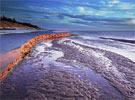
Cyclone in Myanmar, earthquake in China and dust storm in India – all in a span of one week – are the grave manifestation of climate change. The devastation story reflect in casualty which engulfed over 50,000 people in China while in Myanmar about 15,000 people (or may more) died and in India well over 60 have succumbed to the nature’s fury when the reports last came in.
The fast evolving climate change all over the world has the potential to cause many more such devastating aftereffects –not only in this part of the world but also in Africa and Latin America. The Intergovernmental Panel on Climate Change (IPCC), a group of scientists from around the world brought together by the United Nations, evaluates our current understanding and the potential impacts of climate change. According to its current findings the world's surface air temperature has increased by an average of 0.6C during the 20th Century which has resulted in rising sea level.
During the 20th century, sea level rose 10-20 cm (4-8 inches) due to melting glacier ice and expansion of warmer seawater. It is predicted that sea level may rise as much as 85 cm (33 inches) during the 21st century. This is a threat to coastal communities, wetlands and coral reefs. Since ice in the Arctic sea region is melting, the summer thickness of sea ice is about half of what it was in 1950. Melting Arctic sea ice may eventually lead to global changes in water circulation and melting ice speeds up warming of the Arctic because water absorbs much more heat than the ice .
Climate-sensitive diseases such as diarrhoea, malaria and protein-energy malnutrition claims millions of lives globally. Added to this the devastating indirect health impacts anticipated from the effect of climate change will have on food crops and the availability of fresh water in large areas of the world. It is vital that every one is aware of the health issues and the urgency of goals to be achieved. Unstable and changing climate affects health through heat waves, storms, floods and droughts which kill tens and thousands each year.
International symposium on “Effects of Climate Change on the World’s Oceans” is going to be held at Gijon, Spain during May 19-23, 2008, where the concerned stakeholders from around the world will discuss the issues at hand that are affecting the water bodies and their aftermath for world community.
Science Daily (March 12, 2007) says that scientists at the University of Liverpool, as part of the UK-India Education and Research Initiative (UKIERI), are investigating the anticipated effects of climate change on India's monsoon season and the impact that alterations in India's water cycle will have on the country's people, agriculture and wildlife. Changes to India's annual monsoon are expected to result in severe droughts and intense flooding in parts of India. Scientists predict that by the end of the century the country will experience a 3 to 5ÚC temperature increase and a 20% rise in all summer monsoon rainfall. There can be adverse impact as well. For example, Bundhelkhand, which had seen a reduction in rainfall in successive years from 987 mm in 2003-04 to 240 mm in 2007-08, due to which 40% people have migrated from their homes and the region has faced violent conflicts over water. The poor would be most affected by climatic upheavals leading to extreme events like floods and droughts.
Climate change studies undertaken so far reveal that action is essential in order to prevent long term damage to India's water cycle. The livelihood of a vast population in India depends on agriculture, forestry, wetlands and fisheries and land use in these areas is strongly influenced by water-based ecosystems that depend on monsoon rains. Changes to the water cycle may also cause an increase in water borne diseases such as cholera and hepatitis, as well as diseases carried by insects such as malaria. According to one study, 35–40% of the worst catastrophes have been climate change related. Over the past three decades, the proportion of the global population affected by weather-related disasters has doubled in linear trend, rising from roughly 2% in 1975 to 4% in 2001
The concentration of carbon dioxide in the atmosphere has reached a record high, according to new figures that renew fears that climate change could begin to slide out of control. Scientists at the Mauna Loa observatory in Hawaii say that CO2 levels in the atmosphere now stand at 387 parts per million (ppm), up almost 40% since the industrial revolution and the highest for at least the last 650,000 years.
Scientists believe that the fluctuating weather conditions in a country suggest that the it is reeling under climatic chaos. For more than a decade now, the country has been experiencing contrasting extreme weather conditions: from heat waves to cyclones, from droughts to floods. Orissa for instance is a state, which is a classic example of climate change events. In addition to the extreme weather conditions, there have been instances such as destruction of mangroves along the coast, a fairly steep fall in agriculture and forest productivity, coral bleaching etc.
What we want to see is that the rich nations keep promises they made under the UN Framework Convention on Climate Change in 1992 that they would make the first move in cutting emissions. And so far there is little sign of improvement on the same. Scientists are warning us that if we fail to cut emissions, the future will be full of complexities with erroneous change in the climate, it will be tough fighting those changes as it is slow and continuous process which need an immediate attention.
|
|
Read More: Mau


Comments:
jayasurya
November 4, 2010 at 12:00 AM
It was so nice can you please send me some more information to my Email.